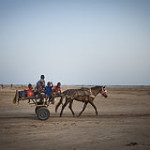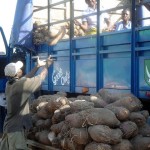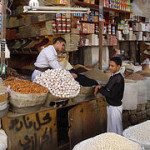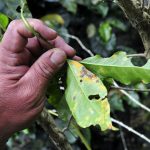Land degradation is a serious threat to long-term food security. To resolve the paradox of growing land values in the face of continually low investment levels, research-based policy action is needed. With this in mind, IFPRI and the Center for Development Research at the University of Bonn (ZEF) researchers, with support from BMZ and later from the CGIAR Research Program on Policies, Institutions, and Markets (PIM), gathered and analyzed existing knowledge on land degradation as part of the Economics of Land Degradation initiative.
Pro-poor Growth and Investment in Lagging Rural Regions of Ghana and Viet Nam
The purpose of this line of research was to understand the role of agriculture in development, and how to achieve economic growth that benefits poor people in the most impoverished regions. To this end, and with support from BMZ and in partnership with the University of Hohenheim, IFPRI built regionalized economic models for Ghana and Viet Nam to evaluate the effectiveness of various development strategies. The work also involved training Ghanaian and Vietnamese collaborators on economy-wide modeling, and coordinating outreach and dissemination of results at the national and international levels.
Ensuring Yemen’s Food Security
In response to the 2007–2008 global food crisis, the Government of Yemen asked IFPRI to develop a National Food Security Strategy (NFSS). IFPRI, building on its previous work on food security in Yemen, provided technical support for the development of the strategy in close collaboration with the multi-ministerial Yemen Food Security Committee and with the support of GIZ, the European Union, and the World Bank. In addition, with support from GIZ’s "One World, No Hunger" Initiative, IFPRI continues to provide evidence-based solutions for tackling hunger in times of war through technical assistance, research and analysis, capacity building, and helping coordinate high-level policy workshops.
Strategic Investment Planning to Improve Growth and Reduce Poverty in Africa
In 2004, BMZ was one of the first organizations to partner with IFPRI in supporting the NEPAD Secretariat and the implementation of CAADP. BMZ’s partnership allowed IFPRI, between 2004 and 2007, to prepare a roadmap to guide the CAADP implementation process, establish the program’s credibility among development partners, and facilitate the adoption of the CAADP agenda by more than 20 African countries and by regional economic communities. From 2008 to 2011, IFPRI assisted the NEPAD Secretariat and regional economic communities in implementing and advocating for the CAADP agenda at the regional, sub-regional, and national levels. IFPRI also helped build the capacity of national teams and experts to lead the analytical work.
Information Services and Analyses on Food and Nutrition Security
The food price crisis of 2007–2008 threatened global food security. The access of households to quality and nutritious food was especially at risk due to their diminished purchasing power. In an effort to assist the United Nations (UN) Secretary-General and the UN High-Level Task Force (HLTF) on the Global Food Security Crisis, GIZ supported IFPRI in delivering relevant information and cutting-edge analyses on food and nutrition policy actions.
Innovation in Insurance: Managing the Risky Business of Weather
On March 29-30, 2017, the Chicago Council on Global Affairs will host the Global Food Security Symposium in Washington, D.C. IFPRI has been helping design and evaluate index insurance products to aid farmers in mitigating the impact and managing the risks associated with severe weather and crop loss.
Innovations for Stimulating Improved Water Management
World Water Day will be celebrated on March 22. IFPRI has been using experimental games on the ground to measure collective action and test theories about behaviors regarding common pool resources.
The Global Hunger Index
To rank countries and illustrate trends in hunger worldwide, IFPRI, Concern Worldwide, and Welthungerhilfe developed the Global Hunger Index (GHI), which captures four indicators of hunger: undernourishment, child wasting, child stunting, and child mortality. Using data from the Food and Agriculture Organization of the United Nations (FAO), the World Health Organization (WHO), and UNICEF, the index ranks countries on a 100-point scale, with 0 being the best score (no hunger) and 100 being the worst. The GHI is updated annually to track progress. By highlighting this information, the index serves as a tool for mobilizing political will and promoting effective policies to combat hunger. For more than a decade, the GHI has helped to increase country accountability in order to reduce hunger and undernutrition.
Strengthening Resilience in Latin America
Climate change and agricultural diseases threaten the food security and livelihoods of many poor people in developing countries. IFPRI’s research in Latin America examined these environmental shocks, helping to bring the urgency of adaptation and mitigation to the forefront and to convince policy makers to act to build the poor’s resilience. In the 2000s, little >> Read more
Enhancing South-South Learning: From Brazil to Africa
Brazil has made impressive progress in reducing poverty. Rural poverty has been cut almost in half, from 51 percent in 2002 to 29 percent in 2011, and family farmers’ incomes grew by 50 percent. These results were achieved partially through Fomento, a set of government-run social programs targeting smallholder farmers. When a program shows such >> Read more
- « Previous Page
- 1
- …
- 3
- 4
- 5
- 6
- 7
- …
- 22
- Next Page »











